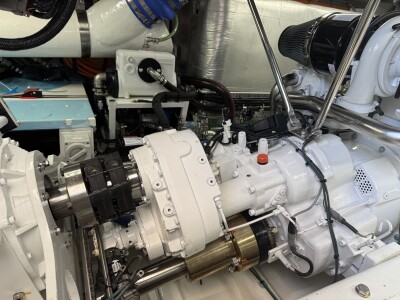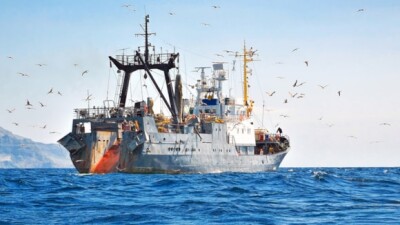Good intentions...
There's a three-way intersection along Route 1 in Ogunquit, Maine — known as The Square — that gets quite busy in the summer.
When I was a child, cars tended to back up out of proportion with the duration of red lights. The state added a right lane, but within a few years the backups were worse than ever.
So the police department put a cop in the square. Then, fearful he'd be run over, they pulled him out. Today there's a flashing light and a couple of stop signs, and more traffic than ever. But it moves.
That's not to say there's no congestion or backups. But after years of both observation and intervention, local and state officials — whether through intuition or higher mathematics — have perceived the role of disorder in an orderly system.
For hundreds of years, we fished the northwest Atlantic as we pleased, and for all of our concerns about foreign fleets, we never ran out of fish.
Then, in 1976, we passed the first Magnuson Act, designed primarily to secure our fisheries through a 200-mile limit and a system of regional councils, and things have gone to hell ever since.
Perhaps the biggest mistake we made at the time was the creation of the Capital Construction Fund, a tax shelter that created an incentive to build fishing vessels that unfortunately had nothing to do with productivity.
Ever notice that Congress has a way of naming laws just the opposite of their consequences? In 1996 came the Magnuson rewrite known as the Sustainable Fisheries Act, ostensibly passed to help beleaguered fish stocks to their feet. Instead, it shifted the burden of beleaguerment to fishing communities and infrastructure while feathering the beds of the crisis-mongers and attorneys who overpopulate the conservation movement.
If this were Plato's Republic, conservationists would be among our wisest and most revered citizens, guardians at the nexus of wise use, full employment and economic growth.
But it is not, and they are not. Fishery management has been subsumed by conservation for its own sake, the result of which has been our fool's errand of restoring all stocks at once.
Fishery managers accord only one attribute to fishermen — insatiability — and lament the so-called serial depletion of stocks and the "tragedy of the commons," neither of which is as axiomatic as the prophets of doom would have us believe.
Are we serially depleting stocks if we fish for things in season, or when it makes economic sense? I would argue that we are not. Generations of fishermen sailed in the direction of the greatest profitability, recognizing that it was the natural order of things that one stock was down and another was up.
"There were times we thought we'd starve to death, but we never did," Carl McIntire Sr., who in his lifetime fished for lobster, halibut, tuna, mackerel and herring, among other things, would tell us cove rats. "There were times we thought we'd get rich, but we never did that either."
McIntire and the other old-timers responded to the rhythms of the sea, rhythms of late drowned out by wailing about historic abundance, 10-year rebuilding timetables, and vessel buy-backs.
When I started as a deckhand in the early 1970s, most of Maine's big boats went redfish fishing, but some, not quite as big, chased swordfish, and the rest went after whiting. In winter, everybody went shrimping. A few years later the picture was quite different: The shrimp went back to Greenland and the redfish pooched. But groundfish had become abundant. And flatfish like dabs (American plaice) and gray sole (witch flounder), the latter in particular regarded as a way-Down-Easter, showed up in 40 fathoms to the westward with such a vengeance they became the lifeblood of a generation of inshore fishermen like me.
Today's fisherman can no longer go where the fish are. Instead, he's compelled to zero in on a species at the direction of a federal agency that won't be able to figure out what he caught this year until next year. But he can't stop, or he'll lose catch history or surrender days at sea.
Anyone truly concerned about serial depletion of fish stocks should get bureaucrats out of the fishery management business. The truth is, "serial depletion" describes our management regime since 1996.
Management is not malevolent, but it is under tremendous pressure to manage, not just from conservationists but also from politicians who feel either popularly or financially beholden to them.
Unable to count fish, NMFS counts boats with an eye toward subtraction. This is where the "tragedy of the commons," which holds that individual farmers will inevitably place too many animals in a common grazing area, is invoked: Independent fishermen are fated to over-harvest the ocean's unfenced seascapes.
The answer, adherents to this theory say, is to "fence off" the ocean by awarding shares of the fish to individual fishermen. If ensuring that each share is profitable means eliminating boats — "rationalizing the fleet" — so be it.
I don't buy it. The tragedy cannot play itself out, because when there's no longer enough grass for the critters, the farmers will move them or the herd will shrink to a size the grass can sustain.
What do you do when the fish play out where you are? You move or quit fishing. The real question isn't how many vessels the ocean can support; it's how many boats can support themselves.
The ocean lays out the rules by means of an infinite number of variables we can measure — weather, currents, thermoclines and spawning cycles, for example — but not predict.
Much remains mysterious. We've seen Pacific halibut bounce back from oblivion in what naturalists must regard as the twinkling of an eye, yet Atlantic halibut have dithered about recovery for 100 years or more.
We shake our heads at the cod's apparent abandonment of much of the northwest Atlantic for places like Greenland and Scotland.
And where, we wonder, did all those Bering Sea crabs go a few years ago — and why?
The idea of stripping fishing grounds as you might a wood lot is heretical in 2006. And despite my faith in markets, I appreciate that they react to events, and that in resource management, we should anticipate events.
But what has the Sustainable Fisheries Act done for you? By any economic standard, the fishing business has gone downhill in the last 10 years: There are fewer vessels, there are fewer fishermen, and coastal communities from Maine to Alaska to Hawaii are on their knees.
NMFS crows about stock recovery and rationalization as if it has all been a success. The truth, of course, is that the agency has us sailing in the wake of the family farmer.
This industry's last best hope is science. The conservationists may not trust you and the politicians may not need you, but the observations of fishermen with intense experience on small slices of ocean are invaluable to scientists trying to make sense of it all.
To that end, I'm vitally interested in the upcoming symposium in Boston, Fishing Technology in the 21st Century: Integrating Fishing and Ecosystem Conservation.
Presented by the International Council for the Exploration of the Sea, the five-day (Oct. 30 to Nov. 3) conference will focus on integrating commercial fishing and ecosystem conservation — which is another way of saying gear development.
The organizers are placing special emphasis on Nov. 3, which is to be stakeholder day, on which they hope to engage in dialogue with as many fishermen as possible.
Meanwhile, check out this month's Dock Talk piece (p. 8) by Chris Glass, a conference organizer and fishery scientist held in extremely high regard in this industry.
We can cry about the unfairness of it all, but doing so won't get us any fu
rther in the next decade than it got us in the last one. We need to be pragmatic and put ourselves in a position where there is no credible argument to oppose what we're doing.
* * *
Don't forget to get those crew shots in here by Oct. 31 for our January issue. Your best bet is to e-mail them to me at [email protected].
— Jerry Fraser






